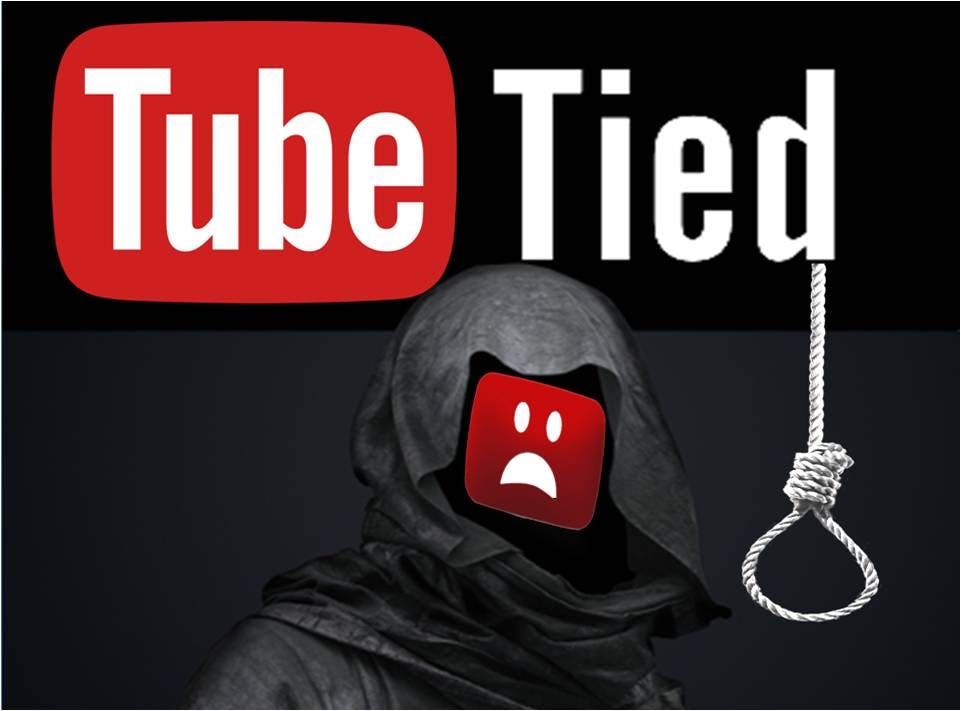TUBE TIED
MONOLOGUE WRITTEN BY CLYDE LEWIS
Back in the mid 1990’s when the internet was new and blogging and self publishing was something that consisted of a few words on a white screen, the citizen journalist was born. The lonely writer who sat down and put down his thoughts eventually became a blogger. The blogger became the podcaster, the podcaster became a YouTube producer and later came the YouTube celebrity. From two girls and a cup, to broadcasting suicides, YouTube has become a free for all – and citizen entertainers and journalists have produced both insightful perspectives, interesting ideas, and some ideas that are considered slanderous and hateful.
Citizen journalists have become regular contributors to mainstream news, providing information and some of today’s most iconic images, especially where professional journalists have limited access or none at all. While some say that citizen journalism has improved journalism, the mainstream media has ginned up fear that too much importance is placed on these personal accounts.
They claim that conspiracy theorists have taken over the internet and that the mainstream media has declared war on anyone who questions their framed narrative.
They are now shouting from their various corporate studios that citizen journalists should no longer be trusted — they claim that any form of dissent or editorializing against the framed narrative undermines ethical standards and, eventually, it will put an end professional journalism.
Todayundefineds news cycle is such that we are bombarded with information, much of it fake news and most of it echo and spin. There are excellent journalists, bloggers and academics out there, but too often they go unheard in the electronic haze of hysteria that passes for undefinednewsundefined.
The mainstream media has few journalists worthy of the name on the payroll, but now there are plenty of those so called journalists that are willing to compromise themselves for kickbacks and political approval.
The CIAundefineds Operation Mockingbird exposed collusion between government and media decades ago. And today, when some journalists routinely submit their drafts to powerful interests before publication, getting undefinedthe right peopleundefined who will undefinedstick to the scriptundefined into media is a relatively easy job.
The corporate monopolies on information should be investigated again for improprieties and spinning false narratives, but keep in mind that a free press has the power to not only report valid stories, but to also allow for propaganda and spin to seep into the narrative to endorse a political agenda or ideology.
However, it is now apparent that the free press or in this case, a free citizen’s press, is now under attack.
YouTube has been accused of censorship after introducing a controversial new policy designed to reduce the audience for videos deemed to be undefinedinappropriate or offensive to some audiences.undefined
The Google-owned video site is now putting videos into a undefinedlimited stateundefined if they are deemed controversial enough to be considered objectionable, but not hateful, pornographic or violent enough to be banned altogether.
They have also demonetized certain videos that they find objectionable.
Now, even though people are crying foul and are screaming censorship—You Tube as a company has the right to refuse its streams to anyone they feel is violating their terms of service.
This is not a popular view, but it is the truth.
This policy has come into force in the past week, prompting anger among members of the YouTube community.
One prominent video-maker slammed the new scheme whilst WikiLeaks founder Julian Assange described the measures as undefinedeconomic censorshipundefined.
However, YouTube sees it as a way of maintaining freedom of speech and allowing discussion of controversial issues without resorting to the wholesale banning of videos.
Videos which are put into a limited state cannot be embedded on other websites.
They also cannot be easily published on social media using the usual share buttons and other users cannot comment on them.
The other complaint is that the policy is not being fairly distributed and many are complaining that videos that contain materials that question the mainstream narrative’s positions politically are being taken down – or they have been receiving warnings that their sites will eventually be shut down.
Facebook, for instance, has been grappling with ‘fake news’ for years and found no definitive solution, in part because it doesn’t want the regulation that could come with being treated by lawmakers as a publisher or broadcaster rather than a neutral sharing platform.
More insidiously, false or misleading content tends to be very effective at getting users’ attention, which generates revenue both for its creators and the platforms that help spread it.
Cynics call this “clickbait” and it does generate revenue.
But YouTube’s decision to remove various videos from what they call undefinedconspiracy theoristsundefined signals a willingness to more directly curate content and also shape the culture.
This sends a very terrifying message about what the internet is facing and what citizen journalists must do to avoid shut downs.
Now, it has to also be said that what Julian Assange has said about the move being economic has merit because advertisers on YouTube are so closely linked to the site’s content, with ads running directly before monetized videos, including various sites that are generating content that may be seen as disinformation. Advertisers have sometimes felt that their brands were threatened by any proximity to controversy– for instance, major advertisers pulled ads from YouTube late last year after an investigation highlighted videos that appeared to exploit children.
When Ground Zero first covered the Sandy Hook shooting, we addressed the issue of crisis actors and the conspiracy theory that the incident never happened. We didn’t endorse the conspiracy theory, but we felt that the anomaly of many people not convinced of the incident was worth talking about.
The entire discussion was taken out of context by a journalist in San Diego who organized a campaign to notify advertisers that I was entertaining this particular conspiracy narrative.
I notified my superiors that the discussion was worthy of airtime and that I did not support the Sandy Hook hoax narrative.
That did not matter to a particular advertiser.
A company without asking any questions or even wanting to know what was said distanced itself from me – this affected my ability to make money.
This is exactly what is happening at YouTube.
I am sure it will be spun into another conspiracy theory by those who have been shut down, but I can assure you that ever since I have been doing what I have been doing, being shut down or having your shows mysteriously shut down has now been a routine thing for me.
It just means you tap danced on someone’s frayed nerve, and if that frayed nerve happened to belong to an advertiser, you lose.
Its ratings, its advertising , it is all that but it is also a responsibility for the producer of content to be aware of how it affects the consumer, and those who are paying out the money for you to be producing your content in the first place.
It is unfortunate that citizen journalists are now meeting up with the cut throat styles of those that don’t want to see you making money being controversial.
You can also put some blame on a conspiracy theory that was spun about undefinedRussian Meddlingundefined– what the mainstream media failed to report that the whole “meddling” schemes was nothing more than counter propaganda being used on Facebook, Twitter, and YouTube.
It was used to sow the seeds of dissent. It had nothing to do with the election, but he media will have you believe that this is true.
Russia’s Internet Research Agency was recently highlighted in charges from Special Counsel Robert Mueller for its operations “to interfere with elections and political processes.
However, the Russian operations are just a small part of a much larger picture. Special interest groups, governments, and big businesses are trying to alter the way we perceive information in order to influence the culture and underlying values of our societies.
Money can buy a whole lot of political manipulation – it can buy a whole lot of shut down and it can buy a whole lot of culture jamming.
It will also buy a whole lot of dissention, chaos, and maybe even anarchy.
This is why I say, your vote is your dollar if you patronize the companies that advertise with the people whose views you support, then those views will remain in zeitgeist—it will shape the dialogue and the dialogue shapes the culture.
The advertiser remains keeping the views going; otherwise, the producer of content will have to ask for contributions or they privatize their content – if no money comes in using that option, the person who generates content no longer has a platform.
Others know, including the Russians that a few dollars can also socially engineer an entire country.
What we are witnessing is something that 5 years ago I talked about; in fact, it was one of the least favorite topics of my listeners at the time so I abandoned it.
The topic was “memetic warfare.”
A meme is an idea that can “evolve” over time, and eventually influence culture. Memes are often associated with funny pictures overlaid with text. Yet the concept goes much deeper, and can be anything from music, to movies, to words and their perceived meanings.
Memetic warfare is a weaponized use of memes to intentionally introduce ideas into society, packaged in a way that allows them to spread, with a goal to alter the culture and perceptions of a targeted population.
A goal of memetic warfare isn’t to alter reality, but instead to alter the perceived reality.
The most profound weapon a nation or special interest group can possess is ‘control’ over information. This contributes to control over the narrative, and the meme is the embryo of the narrative.
If it is nurtured it becomes a falsehood that is believed without question and is spread all over – the internet has the ability to shape culture, if only certain groups can produce memes. The story then becomes “approved” by the powerful.
In the book, “Information Warfare,” James Scott brings up an excellent point about memes and censorship and how it affects culture.
He says “Censorship is about what you don’t see, rather than what you do see. Digital gatekeepers provide users with only the content that they want them to view.”
Other entities play a role in helping shape the ideas and control people’s exposure to ideas that don’t fit the objective.
“Corporate nation state propagandists, such as Google, Twitter, YouTube, and Facebook, perpetuate the syntactical amalgamation of censored ideas, narrative illusions, and perception steering initiatives that cripples and imprisons the mind,” it states.
The nature of warfare has changed. As the book notes, war has moved beyond merely killing an enemy or capturing and holding territory. The war of messages has taken over, and “The emerging hybrid war depends on the allegiance of civilian populations and control over narrative.”
The book poses a question. It cites French philosopher René Descartes, stating, “I think, therefore I am,” and adds, “but who does one become when the thought is hijacked?”
It raises the issue that as political organizations, social networking companies, legacy news outlets, and other powerful groups work together to manufacture ideas intended to alter the perceptions of a country, how can people recognize what thoughts are their own and which thoughts have been planted?
In today’s world, “Information Warfare” states, websites like Facebook are nearly as relevant as the United Nations, information-leaking website WikiLeaks has intelligence analysts similar to the CIA, and “Google’s dragnet surveillance censorship algorithm has become the new gatekeeper of critical information that could lead society into a new renaissance.”
A shift in power has taken place, moving to “an all-out battle for the psychological core of the global population.


